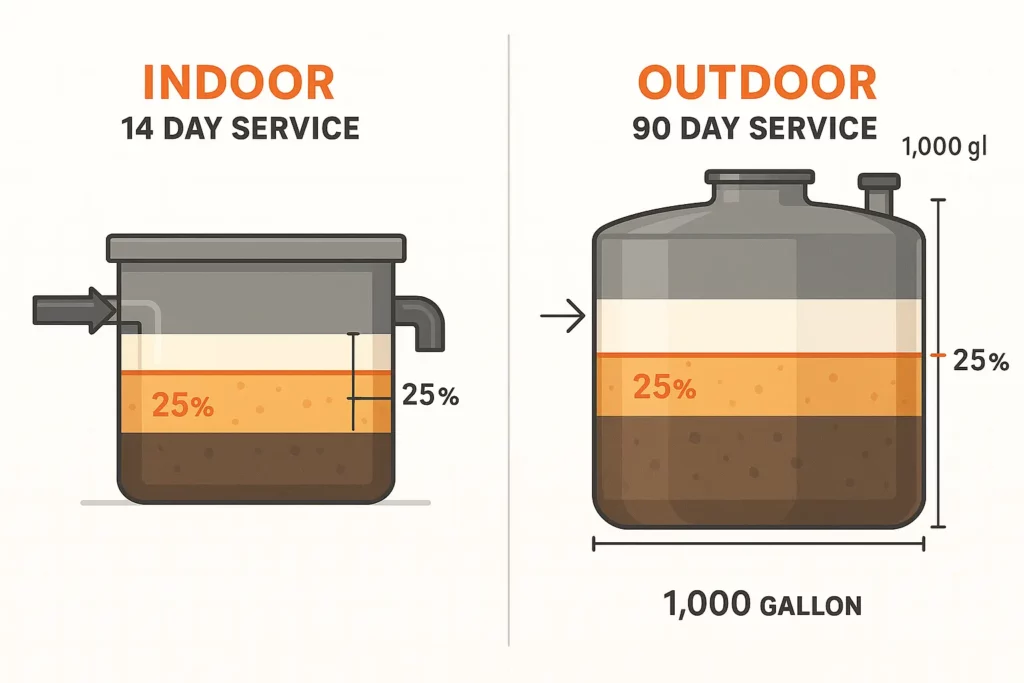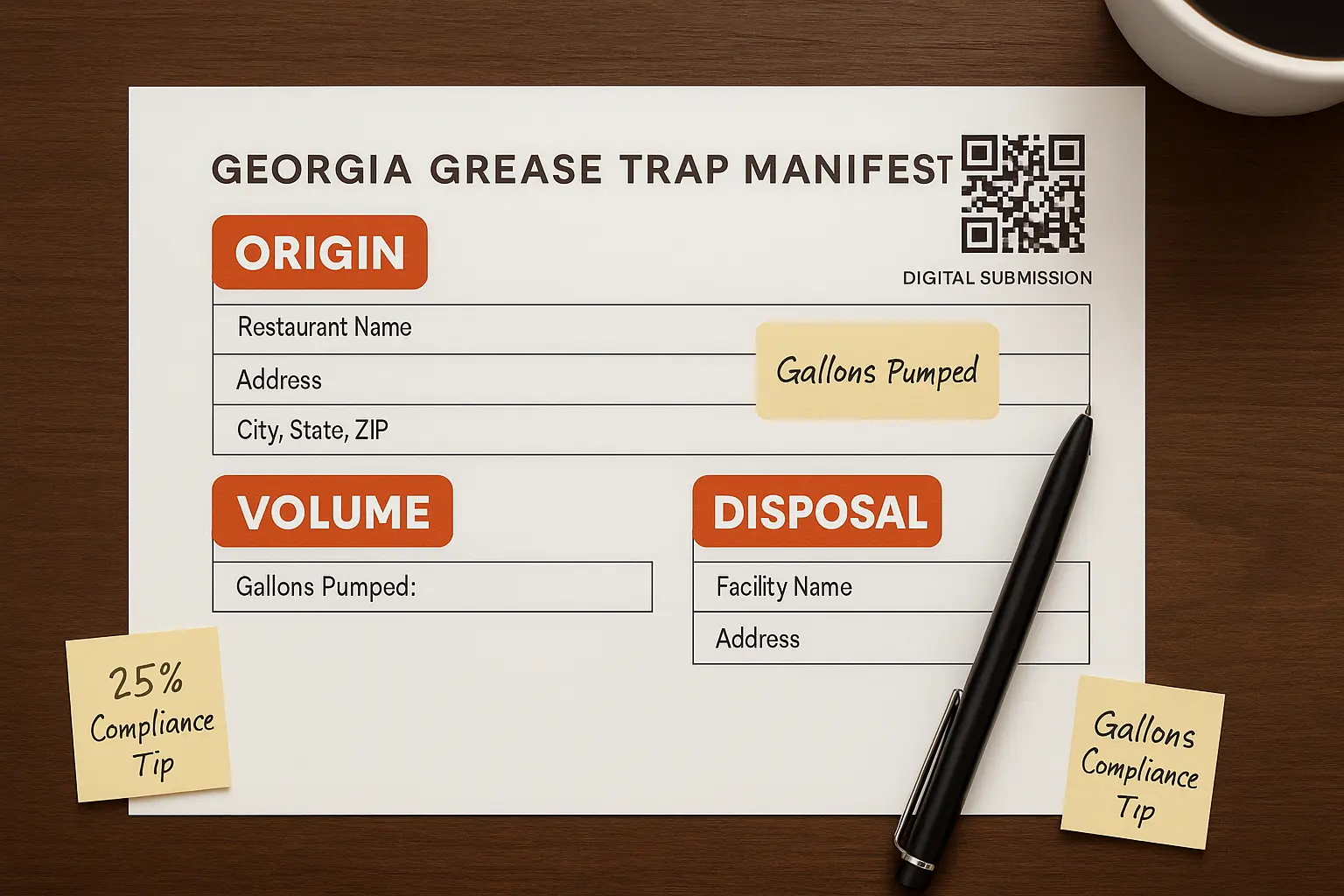Table of Contents
“Grease Spill Tuesday” Why Compliance Matters
On a humid July morning, a Midtown café’s indoor trap overflowed, coating the alley in brown grease and closing lunch service for 48 hours. The city billed $2,300 for emergency jet vac work and cited the owner for failing to pump within 14 days under §154 297.03. The lesson is clear: Atlanta’s sewer crews trace blockages back to FSEs, and the fines travel just as fast. EPA data show that FOG accounts for more than half of U.S. sewer backups.
The Rule Stack Federal, State & City
- Federal. The EPA’s Pretreatment Program (40 CFR 403) urges municipalities to cap FOG at 100 mg/L and use the 25 percent trap rule.
- State. Georgia Rule 391 3 6 .24 mandates a transporter permit and trip manifest for every load of trap waste.
- Local. Atlanta Ordinance Division 4 sets the 14 /90 day cleaning intervals, requires gravity interceptors ≥1,000 gal for new builds, and empowers inspectors to levy surcharges.
Understanding how these layers interlock is the first step toward a clean inspection.
Size It Right Atlanta’s Grease Trap Sizing & Installation
The city follows the 2018 Georgia Plumbing Code, which points designers to gravity interceptors when flow exceeds 50 gpm. Indoor hydromechanical units are allowed for small cafés but must remain serviceable without dismantling floors. Georgia DPH’s Appendix O offers schematics that inspectors still reference in plan review. Submit your drawings and sizing calculations through the ATL311 plan review portal before pouring concrete.

Pump Out Frequency The 14/90/25 Rule
Atlanta ties frequency to location and capacity:
| Trap Location | Minimum Cleaning Interval | 25 % Rule Trigger | Citation |
|---|---|---|---|
| Indoor (under sink) | 14 days | Remove solids when grease + solids reach 25 % of liquid depth | §154 297.03, EPA |
| Outdoor (gravity) | 90 days | Same 25 % threshold | §154 297.03 |
If inspectors see more than 25 % capacity, they can order an immediate pump out even if you’re within the calendar window.
Manifests, Haulers & “Yellow vs. Brown” Grease
Every load needs a three part manifest: origin, volume, disposal site. Georgia EPD enforces transporter permits and spot checks disposal logs against plant receipts. Distinguish “yellow grease” (clean fryer oil bound for biodiesel) from “brown grease” (trap waste) because mixing can void recycler contracts and trigger hazardous waste fees.
Inspection Day What Inspectors Look For
Inspectors open the lid, measure sludge/grease depth, review three years of manifests, and photograph any bypass piping. Being unable to produce records is an immediate violation, even if the trap is empty. EPA’s inspection manual recommends citing facilities that exceed 100 mg/L FOG or lack documentation. Fulton County’s new portal lets you pre upload logs, reducing paperwork time on site.
Penalties & Surcharges The True Cost of Non Compliance
Atlanta can add an industrial surcharge to your water bill for each month you exceed local limits. Civil fines start at $1,000 per day and escalate to utility shut off for repeat offenders. Private lawsuits are rising too; one Midtown landlord recovered cleanup costs by citing lease grease management clauses. Grease Connections estimates insurance carriers may raise premiums after one documented overflow.
One Day Compliance Roadmap
- Check Depth Dip stick every trap; schedule pump out if >25 %.
- Verify Hauler Permit Ask for Rule 391 3 6 .24 ID.
- Update Manifest Binder File PDFs and hard copies in date order.
- Walk Through Self Audit Use EPA’s FOG checklist and snap time stamped photos.
- Set Reminders Calendar 14 and 90 day alerts; most violations occur when turnover disrupts routine.
Do this today and tomorrow’s inspection becomes a formality.
Expert Tips & Common Mistakes
- Grease enzymes are allowed, but only as supplemental maintenance never as a substitute for pumping, per the Georgia FOG rule.
- Confirm interceptor p trap vents: inspectors flag sewer gases trapped under lids.
- Label yellow grease bins clearly; EPA reports contamination spikes during festival season when temp staff are hired.
Most failed inspections stem from good intentions: staff assume outdoor traps can “wait one more week.” Stick to the calendar, not the kitchen rush.
Trust Grease Connections
Need a certified pump out or used cooking oil recycling services in Atlanta before the next inspection? Schedule a 24 hour turnaround or download our free “Grease Log Binder” template today.









